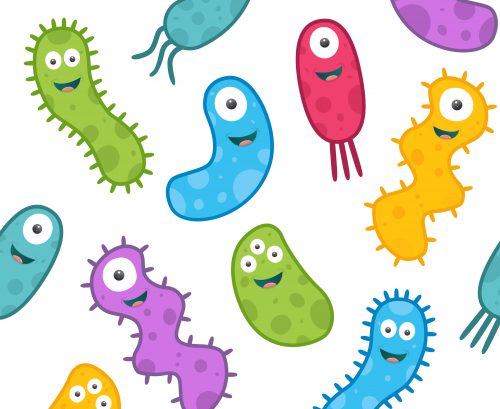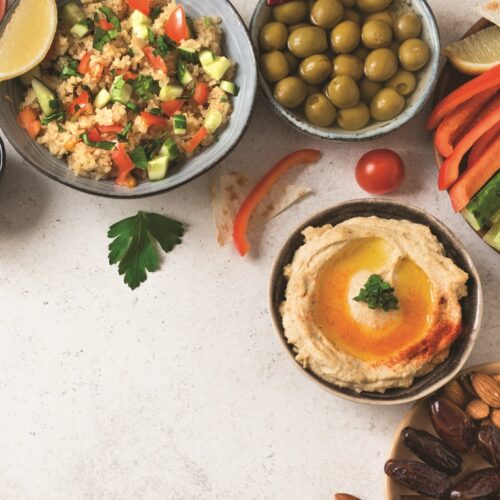
What if an infusion of good bacteria could have a positive, lasting effect on your weight? Dietitian Tim Crowe explains how a thriving gut ecosystem offers exciting potential for managing weight and keeping healthy.
Imagine this: inside our digestive tract are millions of live bacteria, viruses and microbes living as an ecosystem, just like the plants and animals found in a rainforest.
Collectively, these bacteria are known as the gut microbiome, and this ecosystem runs all the way from our throat to our colon.
We also have skin microbiota, oral microbiota and, in females, vaginal microbiota. But it’s the gut microbiome that appears to be key in determining our overall health.
From the moment we are born, everything we swallow influences what kinds of microbes live in this ecosystem. Then, as we age, illness, antibiotic use, stress, injury and changes to our diet all affect the unique blend of microbes. If we were to map a person’s microbiome, it would be as individual as their fingerprints.
Over the past decade, scientists have begun to unravel the role that our gut microbiome plays in many facets of our life.
Immunity, mental health and body weight all seem to be influenced by these microscopic organisms. It’s one of the most exciting frontiers of science and, with discoveries made so frequently, it’s like a rolling news story.
How gut bacteria determine weight
Early clues into how these microbes interact with our weight came from studies in adult twins. Researchers discovered that when one twin was lean and the other was overweight, the lean twin had a more varied ecosystem of gut microbes than their overweight sibling. Conducting studies on humans can be complicated, so preliminary trials looked at what would happen to mice if their gut bacteria were manipulated — would their body weight change? Identical mice were injected with microbes from obese and thin human twins. The mice that received the bacteria from the obese twin gained more weight and had a less-diverse community of microbes in their gut than those that received bacteria from the thin twin.
Through studying twins, scientists realised that there was more to our gut microbiome than genetics and early life. They found that a diet that is high in processed foods and low in fibre is associated with a less-diverse ecosystem of gut microbes.
How these microbes affect our weight took an interesting turn when a French research team noticed that, 20 minutes after eating, certain key microbes produced hormones that play an important role in regulating our appetite. They gave these hormones to mice, which then ate less food.
It is no coincidence that the 20-minute mark after a meal is around the time a person feels full. This may be a key factor.
If you want to curb your appetite, eating slowly may give your gut microbes time to ramp up production of these appetite hormones, so you’ll stop eating sooner.
Bad news on yo-yo dieting
It’s sad but true that most attempts at dieting fail and the weight creeps back on and, for some, the weight comes back with interest. Gut microbes could be playing a part here too.
Using a yo-yo dieting model in lab mice, Israeli scientists found that these mice had less diversity in their gut microbes than those eating normally. They also regained weight rapidly.
The changes to the gut microbiome brought about by obesity stayed put for far longer than the time spent dieting. This could explain why it’s so hard to lose weight when you try your next diet – your gut microbes are still reeling from the effects of the last one.
What do you suppose happens when microbes from yo-yo dieting mice are transplanted into normal-weight mice? They gain weight. These injected mice also digested fibre less efficiently. Fewer beneficial by-products were being made from polyphenols, a class of plant chemicals that can act as a prebiotic, increasing the number of healthy bacteria in the gut. Many fruits and vegetables, dark chocolate and tea are good sources of polyphenols, and make great food for our gut microbiome.
Putting it into perspective
Studies in mice are all well and good for exploring a theory, but what do they mean for us? Can changing what we eat change our gut microbiome and help us towards maintaining a healthy weight? It’s too early to make any conclusive claims, but the news to date is largely positive.
A study involving African Americans who swapped their meat-heavy, highly processed meals for a high-fibre, low-fat diet typical of Africa, rich in fruits and vegetables, saw a positive change in gut microbes in just two weeks. The reverse swap found that when rural South Africans switched to a typical American diet, their microbe profile was more in line with a higher risk of colon cancer.
Although two weeks is a short period of time, it’s long enough to make changes to the microbe population in our gut that can alter our risk of disease.
What the future holds
When more is understood about the microbiome, health experts may be able to provide us with individualised dietary advice, tailored to our unique microbiome signature.
In 2015, Israeli researchers devised an algorithm to successfully predict an individual’s blood-glucose response to food, partly through mapping their gut microbiome.
So, can nurturing our gut bacteria guarantee weight loss? While scientists are not able to offer definitive proof, the signs are promising. Meanwhile, what we are able to say for sure is that tweaking our diet to promote a better gut microbiome is in line with heathy-eating guidelines already in place for lowering our risk of chronic disease.
What to eat for a healthy gut
You really are what you eat, because the different strains of bacteria in your gut change depending on the food you consume. While researchers have yet to establish what the ‘perfect’ diet is for gut health, they do know the worst way of eating for your digestive ecosystem: too many processed foods, too much sugar and not enough fibre. The good news is that a shift to a healthier diet can change the bacteria mix in as little as a few days.
To feed your gut ecosystem and help it thrive, aim to eat more foods high in different types of fibre, as these provide nourishment for good gut bacteria. Incorporate some fermented foods too, as these are probiotic, meaning they contain healthy bacteria.
For improved gut health, you could consider including more of the following foods in your diet.
- Aromatic vegetables including onions, leeks, garlic and Jerusalem artichokes, are high in a type of carbohydrate called inulin, which bacteria use to promote healthy colon cells and provide other benefits.
- Barley and oats are rich sources of the soluble fibre, beta-glucan. Beta-glucan acts as food for your good gut bacteria, and helps lower cholesterol.
- Starchy foods, such as potatoes, beans and lentils, and green, unripe bananas are great fuel sources for gut bacteria.
- Fermented foods, such as sauerkraut, kimchi, kefir and yoghurt, contain healthy bacteria to improve the diversity of your microbiome.
Article sources and references
- Breton et al. 2016. Gut commensal E. coli proteins activate host satiety pathways following nutrient-induced bacterial growth. Cell Metabolism 23:324–34https://www.ncbi.nlm.nih.gov/pubmed/26621107
- Menni et al. 2017. Gut microbiome diversity and high-fibre intake are related to lower long-term weight gain. International Journal of Obesity. 41: 1099-1105https://www.ncbi.nlm.nih.gov/pubmed/28286339
- O’Keefe et al. 2015. Fat, fibre and cancer risk in African Americans and rural Africans. Nature Communications 6:6342https://www.nature.com/articles/ncomms7342
- Spector T. 2016. Why frequent dieting makes you put on weight — and what to do about it. The Conversation, theconversation.com Accessed March 2017https://theconversation.com/why-frequent-dieting-makes-you-put-on-weight-and-what-to-do-about-it-69329
- Thaiss et al. 2016. Persistent microbiome alterations modulate the rate of post-dieting weight regain. Nature. 540: 544–51https://www.ncbi.nlm.nih.gov/pubmed/27906159
- Valdes A. 2017. Gut bacteria play a role in long-term weight gain. The Conversation, theconversation.com Accessed March 2017https://theconversation.com/gut-bacteria-play-a-role-in-long-term-weight-gain-74496
www.healthyfood.com










